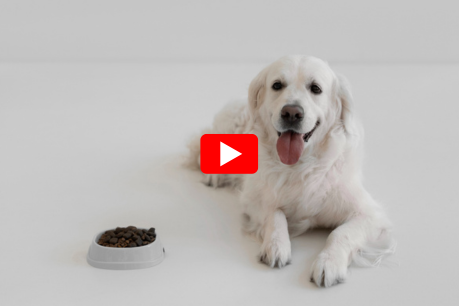Dog Throwing Up Yellow: Causes, Symptoms & Solutions
Dogs, like humans, occasionally experience digestive upsets. One of the most concerning signs for pet owners is seeing their dog vomit a yellowish substance.
This yellow fluid is typically bile, a digestive juice produced by the liver, stored in the gallbladder, and released into the small intestine to help digest fats.
A dog throwing up yellow bile often signals an empty stomach, acid reflux, or digestive issues. If frequent, consult a vet for proper diagnosis and care.
While a single instance may not be alarming, frequent or persistent vomiting can indicate underlying health issues.
In this comprehensive guide, we’ll explore why dogs throw up yellow bile, common causes, when to worry, home care options, and when it’s time to call the vet.
What Is Yellow Vomit in Dogs?
Yellow vomit in dogs is usually a mix of stomach acid and bile. Bile is a digestive fluid produced by the liver that helps break down fats during digestion. When a dog’s stomach is empty for too long, bile can accumulate and cause irritation, leading to vomiting.
The vomit may appear foamy or watery, and its color ranges from pale yellow to a bright mustard hue. While it’s not uncommon, it shouldn’t be ignored if it happens repeatedly.
Common Causes of Dog Throwing Up Yellow
Let’s explore the most frequent causes behind this unsettling symptom:
Empty Stomach
If a dog goes too long without food, stomach acids and bile can build up, causing irritation and vomiting. This is known as bilious vomiting syndrome and often occurs early in the morning or late at night.
Dietary Indiscretion
Dogs are notorious for eating things they shouldn’t—grass, table scraps, spoiled food, or foreign objects. Ingesting non-food items can irritate the stomach and lead to vomiting.
Food Sensitivities or Allergies
Some dogs have sensitive stomachs or allergies to certain food ingredients, which can cause gastrointestinal upset, including vomiting yellow bile.
Acid Reflux (Gastroesophageal Reflux)
Similar to humans, dogs can suffer from acid reflux, where stomach contents back up into the esophagus, irritating the lining and causing vomiting.
Inflammatory Bowel Disease (IBD)
IBD affects the gastrointestinal tract, leading to chronic vomiting, diarrhea, and weight loss. Yellow bile vomit can be one of its symptoms.
Parasites
Intestinal parasites like roundworms and hookworms can irritate the digestive system and result in vomiting bile, especially in puppies or unvaccinated dogs.
Liver or Gallbladder Disease
Since bile is produced by the liver and stored in the gallbladder, disorders affecting these organs can cause bile-related vomiting.
Pancreatitis
Inflammation of the pancreas often leads to nausea, vomiting bile, abdominal pain, and lethargy.
Medications
Certain medications can upset a dog’s stomach or cause acid reflux, resulting in yellow vomiting.
Stress or Anxiety
Emotional distress, new environments, or separation anxiety can lead to stomach upset and vomiting in sensitive dogs.
When Should You Worry?
While occasional yellow vomiting may not be serious, you should be concerned if your dog:
- Vomits frequently (more than once or twice a day)
- Shows signs of pain or discomfort
- Has diarrhea or constipation
- Loses appetite
- Acts lethargic or weak
- Shows signs of dehydration (sunken eyes, dry gums)
- Vomits blood or material resembling coffee grounds
In such cases, immediate veterinary attention is recommended.
Diagnosing the Cause: What Your Vet Might Do
When you visit your vet for yellow vomit, they’ll conduct a thorough physical exam and might recommend:
- Blood tests to check liver and kidney function
- Fecal tests for parasites
- X-rays or ultrasound for blockages or organ issues
- Endoscopy to inspect the esophagus and stomach lining
- Allergy testing if food intolerance is suspected
A proper diagnosis is crucial for effective treatment.
Home Remedies & Immediate Care
If your dog vomits yellow once and otherwise seems healthy:
- Withhold food for 8–12 hours but offer small amounts of water.
- After fasting, feed a bland diet: boiled chicken (skinless, boneless) and white rice in small portions.
- Gradually reintroduce their regular food over 2–3 days.
- Split meals into smaller, frequent servings (3–4 times a day).
- Avoid feeding table scraps or fatty treats.
If vomiting persists or worsens, visit your vet promptly.
Veterinary Treatment Options
Based on the cause, your vet might recommend:
- Antacids or anti-nausea medications
- Antibiotics for infections
- Dewormers for parasites
- Dietary changes for food sensitivities
- IV fluids for dehydration
- Surgery for obstructions or tumors
- Management plans for chronic issues like IBD or pancreatitis
Prompt treatment improves recovery and reduces complications.
How to Prevent Yellow Vomiting in Dogs
Preventative care can make a significant difference in your dog’s digestive health:
- Feed smaller, more frequent meals to avoid an empty stomach.
- Avoid sudden diet changes.
- Keep your dog from scavenging trash, plants, or unknown substances.
- Use veterinarian-approved parasite prevention treatments.
- Maintain routine wellness checks.
- Identify and manage stressors in your dog’s environment.
- Avoid giving your dog fatty or spicy human foods.
Is It Safe for a Dog to Vomit Yellow Occasionally?
Yes — an isolated incident, especially after waking up or when the stomach is empty, is generally harmless. Monitor your dog for other symptoms like loss of appetite, lethargy, or repeated vomiting.
If it occurs often or alongside other worrying signs, consult your vet to rule out underlying health problems.
Special Considerations: Puppies & Senior Dogs
Puppies and senior dogs are more vulnerable to dehydration and serious health issues from vomiting. Even a single episode in these age groups warrants a cautious approach.
Puppies: They may have parasites or dietary indiscretions. Senior Dogs: They may have chronic conditions like kidney disease, liver problems, or tumors.
Final Thoughts
A dog throwing up yellow bile can be distressing, but in many cases, it’s due to minor issues like an empty stomach or mild acid reflux. However, frequent vomiting or accompanying symptoms like lethargy, diarrhea, or weight loss should never be ignored.
Understanding the possible causes, knowing when to seek veterinary help, and applying basic home care tips can help you manage your pet’s health more confidently.
As a responsible pet parent, regular check-ups, proper diet management, and keeping an eye on behavioral changes will ensure your dog stays happy and healthy.
References Link
- Why Is My Dog Throwing Up Yellow
https://www.petmd.com/dog/general-health/dog-throwing-up-yellow-bile
- Vomiting in Dogs
https://www.petmd.com/dog/symptoms/vomiting-in-dogs
- 10 Warning Signs You Should Take Your Dog to the Vet
https://www.healthline.com/health/9-warning-signs-dog-needs-veterinarian
.



